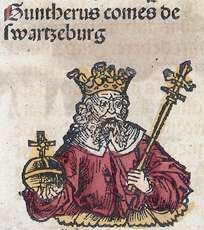Anti-king
An anti-king, anti king or antiking (German: Gegenkönig; French: antiroi; Czech: protikrál) is a would-be king who, due to succession disputes or simple political opposition, declares himself king in opposition to a reigning monarch.[1] The term is usually used in a European historical context where it relates to elective monarchies rather than hereditary ones. In hereditary monarchies such figures are more frequently referred to as pretenders or claimants.

Anti-kings are most commonly referred to in the politics of the Holy Roman Empire, before the Golden Bull of 1356 issued by Emperor Charles IV defined the provisions of the Imperial election. Other nations with elective monarchies that produced anti-kings included Bohemia and Hungary. The term is comparable to antipope, a rival would-be Pope, and indeed the two phenomena are related; just as German kings (Kings of the Romans) and Holy Roman Emperors from time to time raised up antipopes to politically weaken Popes with whom they were in conflict, so too Popes sometimes sponsored anti-kings as political rivals to emperors with whom they disagreed.
Several anti-kings succeeded in vindicating their claims to power, and were recognized as rightful kings: for example, King Conrad III of Germany, Emperor Frederick II, and Emperor Charles IV (see table below). The status of others as anti-kings is still disputed: e.g. in the case of Duke Henry II of Bavaria and Margrave Egbert II of Meissen.
List of anti-kings
Germany
| Name | Dates | In opposition to: |
|---|---|---|
| Arnulf the Bad | 919–921 | Henry the Fowler |
| Henry the Wrangler | 984–985 | Otto III |
| Rudolf of Rheinfelden | 1077–1080 | Henry IV |
| Hermann of Salm | 1081–1088 | |
| Conrad III | 1127–1135 | Lothair III |
| Frederick II | 1212–1215 | Otto IV |
| Henry Raspe | 1246–1247 | Frederick II |
| William II of Holland | 1248–1250 | |
| 1250–1254 | Conrad IV | |
| Richard, 1st Earl of Cornwall | 1257–1272 | Alfonso X of Castile |
| Frederick the Fair | 1314–1330 | Louis IV |
| Charles IV | 1346–1347 | |
| 1349 | Günther of Schwarzburg | |
| Frederick of Brunswick-Lüneburg | 1400 | Wenceslaus, King of the Romans |
German double elections
| Date | King | King |
|---|---|---|
| 1198 | Philip of Swabia 1198–1208 | Otto IV 1198-1215 |
| 1257 | Richard of Cornwall 1257–1272 | Alfonso of Castile 1257-1273 |
| 1314 | Frederick the Fair 1314–1330 | Louis the Bavarian 1314–1346 |
| 1410 | Sigismund of Luxembourg 1410–1437 | Jobst of Moravia 1410–1411 |
Bohemia
| Name | Dates | In opposition to: |
|---|---|---|
| Matthias Corvinus | 1469–1471 | George of Poděbrady |
| 1471–1490 | Vladislaus II | |
| Frederick of the Palatinate | 1619–1620 | Ferdinand II |
| Charles Albert of Bavaria | 1741–1743 | Maria Theresa |
Hungary
| Name | Dates | In opposition to: |
|---|---|---|
| Ladislaus II | 1162–1163 | Stephen III |
| Stephen IV | 1163–1165 |
Japan
Korea
Scotland
| Name | Dates | In opposition to: |
|---|---|---|
| Edward Balliol | 1332-1356 | David II |
References
- OED "Anti-, 2" The OED does not give "anti-king" its own entry, unlike "antipope", but includes it in a list of political "anti-" formations, such as "anti-emperor" and "anti-caesar". The earliest example of anti-king cited is from 1619 (and the next by Dr Pusey). Only the hyphenated form is cited or mentioned.
Sources
- Heinrich Mitteis: Die deutsche Königswahl. Ihre Rechtsgrundlagen bis zur goldenen Bulle, 2nd expanded edition, Rohrer, Brünn, Munich, Vienna, 1944, pp. 113 ff.
- Dietmar Willoweit: Deutsche Verfassungsgeschichte. Vom Frankenreich bis zur Wiedervereinigung Deutschlands, 5th revised edition, expanded with a table of chronology and an attached map, Beck, Munich, 2005, pp. 71 f., 94 ff., ISBN 3-406-52637-3
- Gerhard Theuerkauf: Gegenkönig. In: Handwörterbuch zur deutschen Rechtsgeschichte, 2nd, fully revised and expanded edition. Published by Albrecht Cordes, Heiner Lück, Dieter Werkmüller and Ruth Schmidt-Wiegand as philological advisor. Edited by: Falk Hess and Andreas Karg, Vol. I: Aachen-Geistliche Bank, Erich Schmidt Verlag, Berlin. 2008, Sp. 1995-1996, ISBN 978-3-503-07912-4